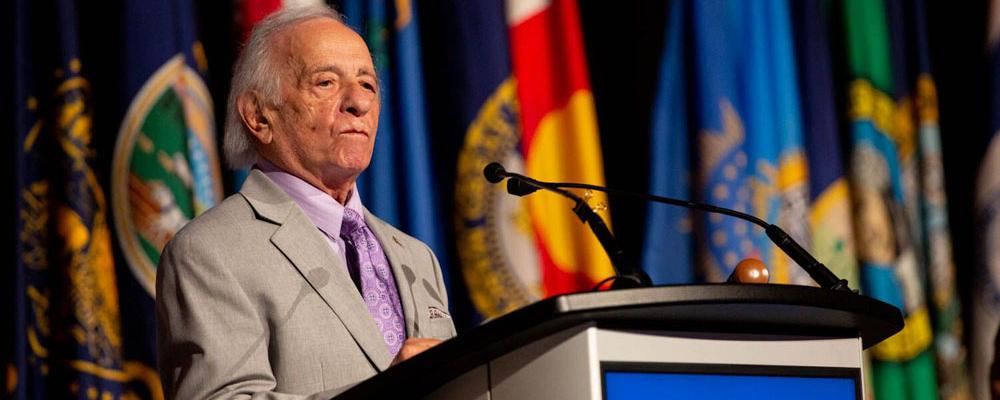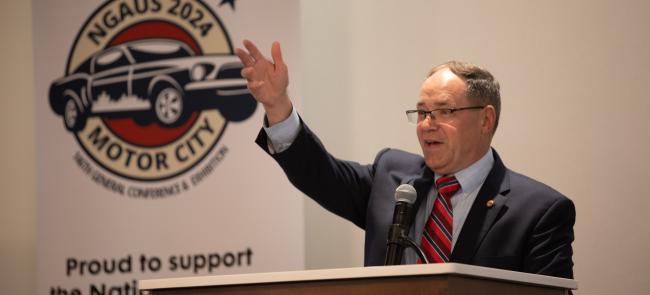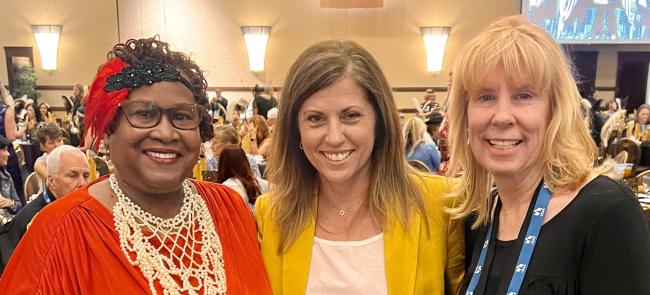
Jack Adler was an eyewitness to one of history’s worst atrocities. And as one of the few remaining survivors of the Holocaust, he issued a warning to leaders of the National Guard gathered in Denver.
“The Holocaust ended 77 years ago now,” Adler said during the 141st General Conference & Exhibition. “What has humanity learned from the evil? Not much.”
Hate continues to permeate the world, Adler said. Even in the United States, Jews, African-Americans and other minorities continue to be targeted “almost equal to the time of Hitler.”
His message was one of tolerance.
“We don’t have to love everyone. I don’t,” Adler said. “But we need to respect everyone.”
That’s the key to the survival of humanity, he said. “Until then, I’m sorry to say, but mankind will continue to destroy one another.”
He made clear that change must come from the highest reaches of the country.
“Until we have a leader that unifies us instead of divides us, [hate] will continue to be a factor,” Adler said.
A U.S. Army veteran who served during the Korean War, Adler volunteered to serve his adopted country as a way to repay those who liberated him.
Adler survived concentration camps in Auschwitz and Dachau, the latter of which was liberated by a force that included members of the Colorado National Guard's 157th Infantry Regiment and the Oklahoma National Guard's 45th Infantry Division. He continues to be actively involved with the Colorado Guard.
“Jack speaks for those who have been silenced and in doing so, imparts valuable lessons,” said Maj. Gen. Michael Loh, the adjutant general of Colorado.
Adler works with the Mizel Museum in Denver to share his story. Since 1992, he has spoken to more than 1.5 million people, including school children and military audiences.
Loh said his remarks inspire others to stand up to racism and bigotry.
Adler briefly explained how hate in his home of Poland escalated to the mass murder of millions of Jews. He was 10 when the Holocaust began and, by the war’s end, was an orphan, having lost his parents, two sisters and a brother.
When the Nazis arrived in Poland, Adler said he watched some locals embrace the occupiers. Within hours, however, Jews were ordered to wear yellow stars on their clothing. They were barred from schools and houses of worship, chased like animals, beat and humiliated.
“If anyone objected to this harsh treatment, they were shot on the spot,” he said.
Adler’s family was moved from one ghetto to another before arriving in concentration camps, where the violence and atrocities only increased.
At Dachau, Adler worked 12-hour days, carrying bags of cement from a rail line to a construction site. Near the war’s end, thousands of prisoners were marched through the forest, with stragglers shot and left for dead.
Adler and thousands of others were liberated on May 1, 1945.
“I would not have made it one more day,” he said.
Today, Adler said he has dedicated his life to ensuring that history does not repeat itself.
“I speak for those who don’t have a voice,” he said.



